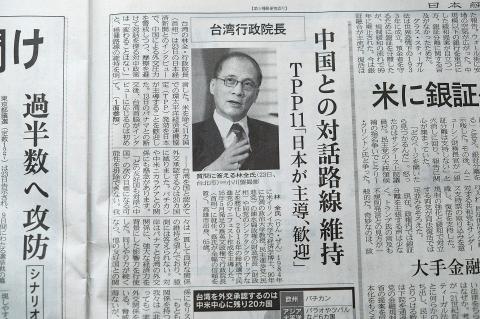The nation still wishes to join the Trans-Pacific Partnership (TPP), even though the US — the former driving force behind the regional trade pact — has withdrawn from the agreement, Premier Lin Chuan (林全) said.
Lin made the remarks during an interview with Japan’s Nikkei daily.
The full text of the interview was posted on the Cabinet’s Web site yesterday.

Photo: CNA
Japan has been pushing ahead with the agreement since US President Donald Trump pulled out of the pact in January following his inauguration.
The TPP was previously led by the US under the administration of former US president Barack Obama.
“We hope to reduce trade barriers,” Lin said, adding that trade is the main driver of the nation’s economic development, which necessitates liberalization.
Taiwan had previously expressed a desire to join the pact and is pleased to see Japan become the leader among the 11 remaining nations, Lin said.
“We would be pleased to have the opportunity to join multilateral trade blocs to further liberalize the market,” he said.
China’s suppression has made it difficult for Taiwan to sign bilateral or multilateral trade agreements with other nations, he said.
However, such obstacles need to be overcome to gain access to trade deals, he added.
Taiwan has a relatively strong economy and its participation would be beneficial to the TPP, he said, adding that the nation also hopes to develop closer trade ties with Japan, other TPP nations, the US and the EU, and to reduce tariffs in bilateral trade.
When asked about Panama’s cutting of diplomatic ties with Taiwan in favor of China, Lin said Taiwan would not yield to Beijing’s pressure.
Beijing claims its establishment of official ties with Panama is the realization of its “one China” principle, but that is its own opinion, Lin said.
The “one China” principle is aimed at making the Republic of China “disappear,” which is something the majority of Taiwanese would not accept, he said, adding that Beijing’s statement also debunked some people’s belief that the “one China” principle allows room for “different interpretations” of what “China” means.
Additional reporting by Lee Hsin-fang

Conflict with Taiwan could leave China with “massive economic disruption, catastrophic military losses, significant social unrest, and devastating sanctions,” a US think tank said in a report released on Monday. The German Marshall Fund released a report titled If China Attacks Taiwan: The Consequences for China of “Minor Conflict” and “Major War” Scenarios. The report details the “massive” economic, military, social and international costs to China in the event of a minor conflict or major war with Taiwan, estimating that the Chinese People’s Liberation Army (PLA) could sustain losses of more than half of its active-duty ground forces, including 100,000 troops. Understanding Chinese

The Ministry of Foreign Affairs (MOFA) yesterday said it is closely monitoring developments in Venezuela, and would continue to cooperate with democratic allies and work together for regional and global security, stability, and prosperity. The remarks came after the US on Saturday launched a series of airstrikes in Venezuela and kidnapped Venezuelan President Nicolas Maduro, who was later flown to New York along with his wife. The pair face US charges related to drug trafficking and alleged cooperation with gangs designated as terrorist organizations. Maduro has denied the allegations. The ministry said that it is closely monitoring the political and economic situation

UNRELENTING: China attempted cyberattacks on Taiwan’s critical infrastructure 2.63 million times per day last year, up from 1.23 million in 2023, the NSB said China’s cyberarmy has long engaged in cyberattacks against Taiwan’s critical infrastructure, employing diverse and evolving tactics, the National Security Bureau (NSB) said yesterday, adding that cyberattacks on critical energy infrastructure last year increased 10-fold compared with the previous year. The NSB yesterday released a report titled Analysis on China’s Cyber Threats to Taiwan’s Critical Infrastructure in 2025, outlining the number of cyberattacks, major tactics and hacker groups. Taiwan’s national intelligence community identified a large number of cybersecurity incidents last year, the bureau said in a statement. China’s cyberarmy last year launched an average of 2.63 million intrusion attempts per day targeting Taiwan’s critical

‘SLICING METHOD’: In the event of a blockade, the China Coast Guard would intercept Taiwanese ships while its navy would seek to deter foreign intervention China’s military drills around Taiwan this week signaled potential strategies to cut the nation off from energy supplies and foreign military assistance, a US think tank report said. The Chinese People’s Liberation Army (PLA) conducted what it called “Justice Mission 2025” exercises from Monday to Tuesday in five maritime zones and airspace around Taiwan, calling them a warning to “Taiwanese independence” forces. In a report released on Wednesday, the Institute for the Study of War said the exercises effectively simulated blocking shipping routes to major port cities, including Kaohsiung, Keelung and Hualien. Taiwan would be highly vulnerable under such a blockade, because it